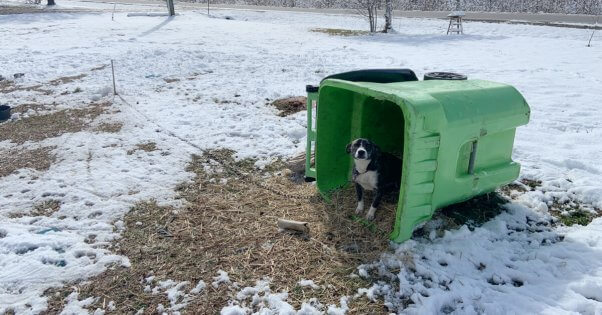Will Your Animal Companions Be Protected in a Fire, Winter Storm, or Other Disaster?
What would happen to your beloved animal companions if a winter storm, a fire, a hurricane, a tornado, an earthquake, a flood, or another natural or human-made disaster were to strike tomorrow?
Review these tips to keep all your family members safe.
Before an Emergency Strikes
- Have an animal emergency kit readily available. The kit should include a harness and leash or a carrier as well as bottled water, food and water bowls, dry and canned food, and a copy of your animal companions’ medical records. If you have a cat, have litter and a small litter tray ready to go. Coats will keep dogs comfortable in cold weather, secure harnesses can help prevent them from getting loose on walks, and booties will protect their sensitive paw pads from the frozen ground. Keep walks short in cold weather, especially for shorthaired dogs.
- Make sure that all your animals have collars or harnesses with identification. Keep a current photo of your animal companion for identification purposes, just as you would for a child.
- Place PETA’s emergency window stickers near your front and back doors and on side windows in case a weather emergency or fire strikes when you are not home. These stickers will alert rescuers to animals in your home who need help.
- In the case of winter storms, bring animals indoors! Companion animals should always live indoors. “Backyard dogs” and “outdoor cats”—like those featured in Breaking the Chain—often go without adequate food, water, shelter, and veterinary care.
During an Emergency
- There’s little to no time to evacuate during severe storms or tornadoes. Never leave animals chained or penned outdoors where they have no protection from strong winds, flying debris, and collapsing structures. Keep your animal companions with you if it becomes necessary to move to a stronger structure or take shelter underground. Hold out in a small interior room such as a closet or hallway. If this isn’t available, take cover under a heavy table or desk. Stay away from windows and doors or walls leading outside.
- If you are being evacuated, never leave animals behind. There is no way of knowing what may happen to your home while you are away, and you may not be able to return for days or even weeks. Animal companions left behind may become malnourished or dehydrated or be crushed by collapsing walls. They may drown or escape in panic and become lost.
- Know your destination ahead of time. Not all emergency shelters accept animals, but many hotels take animals (most suspend “no pet” policies during disasters, thankfully).
- Place small animals in secure carriers. Dogs should be leashed and wearing harnesses. Be sure to take the animal emergency kit that you’ve prepared.
- If you’re sheltering in place during a winter storm or another emergency, remember to protect all of your loved ones. Dogs and other companion animals are no better equipped to survive freezing temperatures or extreme weather conditions than humans are. They suffer terribly from frostbite, and they can die of exposure. Bring them indoors before a storm hits—not doing so could be illegal, as anyone who leaves animals outside to suffer in severe weather may be prosecuted. Good Samaritans who see animal companions kept chained or penned outside 24/7 or without adequate shelter from the elements should note the animals’ exact locations and alert local law-enforcement authorities immediately.
If Authorities Force You to Leave Your Animals Behind
- Never turn animals loose outdoors—they can’t survive “on instinct.” Domesticated animals rely on their human companions for many things and are totally helpless and vulnerable outside, especially in bad weather. Instead, leave them in a secure area inside your home with access to the upper floors so that they can escape rising floodwaters.
- Leave out at least a 10-day supply of water. Fill every bowl, pan, and Tupperware container that you have with water, then set them on the floor or on counters, as just one container may spill. Fill sinks, too. If your toilet bowl is free of chemical disinfectants, leave the toilet seat up to provide animals with one more source of water, but do not make that the only source.
- Leave out at least a 10-day supply of dry food. Canned food will go bad quickly.
- If you can’t get to your home, contact a reliable neighbor or friend to check on the animals and get them out, if possible. Provide specific instructions on care.
By planning now, you can make sure that all your loved ones can weather any storm. Remember: The question isn’t whether a disaster will strike—it’s when.
PETA’s Animal Emergency Fund helps us respond quickly when hurricanes and other disasters put animals’ lives in danger.
Please click the button below to support our rescue team’s critical work for animals by making a special gift right now:
You can be an “angel” for animals by sponsoring a PETA doghouse. We provide lonely “backyard dogs” with sturdy doghouses to shelter them in the snow and freezing temperatures of winter.





